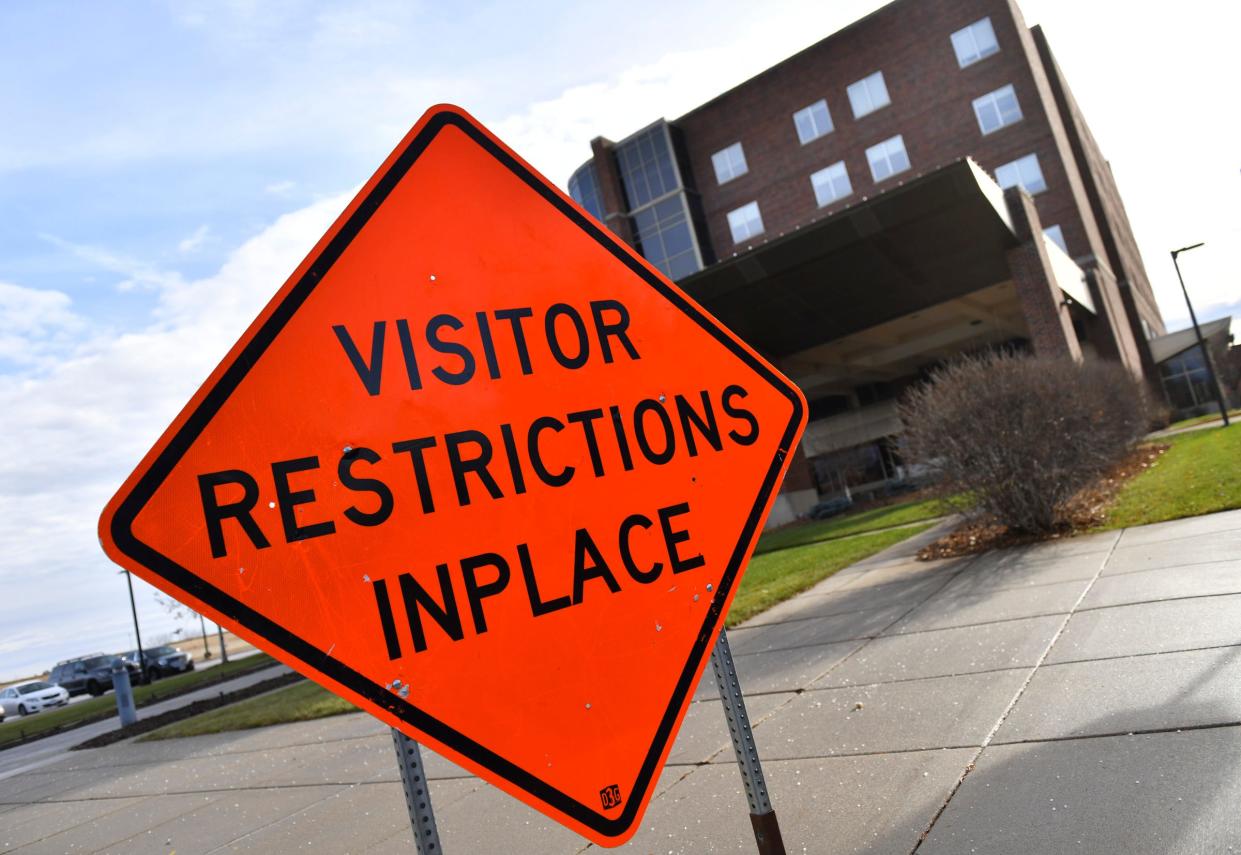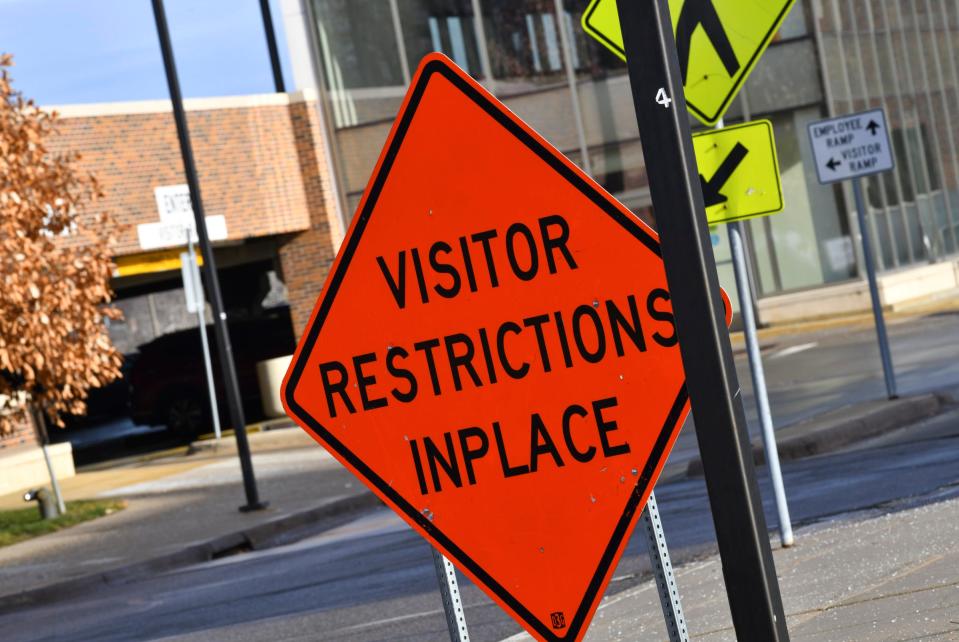Minnesota officials emphasize COVID-19 vaccines, masking as omicron variant enters US

- Oops!Something went wrong.Please try again later.
Minnesota reported 3,580 new cases of COVID-19 and 100 new deaths Wednesday. The death count reflects multiple days of reporting that came out of the Thanksgiving weekend.
At a virtual press conference Wednesday Minnesota Department of Health Commissioner Jan Malcolm and Infectious Disease Director Kris Ehresmann emphasized the importance of getting vaccinated and wearing a mask as the U.S. reports its first case of the infectious omicron variant in California.
More: First confirmed US case of the omicron variant detected in California: COVID-19 updates
Hospital capacity shrinks even tighter
"It's hard to imagine that hospital capacity is even tighter this week than when last we spoke. Sadly that is the case," Malcolm said. "Extremely high capacity in our hospitals is a huge concern for all Minnesotans, whether you need a bed due to COVID, a heart attack, a car accident or any number of other critical health conditions."
As of Wednesday, Minnesota had 1,562 patients in the hospital being treated for COVID-19, including 356 in the intensive care unit.
More: Medical Response Team working 'shoulder to shoulder' with caregivers at St. Cloud Hospital
"Day after day we just keep setting new highs for the year 2021 in terms of the number of people in hospital for COVID," Malcolm said.
Less than 1% of hospital beds in the metro region are currently open, and about 3-4% of beds are open in the southeast and northeast regions of the state, she said.
Only 1% of ICU beds are available in the metro and 3% of ICU beds are available in the southeast, central and northeast regions of the state.
"And there are currently no pediatric hospital beds open in the northwest, west central or south central regions of the state and no pediatric ICU beds available in the central region," Malcolm said.

More: CentraCare ER physician details fatigue, long hospital wait times, lack of beds in COVID surge
Fortunately, more Minnesotans are getting vaccinated and getting booster doses, and 71.3% of all Minnesotans age 12 and up have completed their vaccine series, she said.
More than 1.1 million booster doses have been administered in the state, ranking Minnesota the second in the nation.
No omicron variant cases in MN, but 'we should be prepared'
Although Malcolm said there were no reported cases of the omicron variant in Minnesota as of Wednesday afternoon, "the history of COVID-19 and the delta variant in particular shows us that very transmissible viruses can move very quickly around the globe, and we should be prepared for omicron to show up in Minnesota at some point."
With all 87 Minnesota counties currently in the CDC's highest transmission category, Malcolm emphasized the importance of wearing a mask in public settings.
"Our state is still pretty clearly, firmly in the grip of the delta wave," Malcolm said. "At the rate of transmission we are seeing everywhere in the state, everyone from residents of Apple Valley to Roseville and Zumbrota really should be wearing a mask in public indoor settings."

More: Amid recent COVID-19 surge, SCTCC offers nursing training to National Guard
Malcolm explained that all viruses mutate over time and each new infection in a person is an opportunity for the virus to change.
"That is just one of many reasons why it's so important — here in Minnesota and all around the world — that we do what we can to limit the rate of those new infections and limit the opportunities for the virus to evolve," she said. "We don't want to give this virus any more opportunities to find better ways to infect us and evade our protection."
Especially with more end-of-year holidays on the horizon, Malcolm said, "the most important thing that we can do to prepare for omicron, and to limit the potential for additional viral mutations, is to ensure that everyone who is eligible everyone five years of age gets vaccinated and those who are eligible for boosters … get those booster doses as soon as possible."
Expansion of monoclonal treatments
Due to the high rates of COVID-19 in the state, Ehresmann said demand for monoclonal antibody treatments, which have shown to reduce COVID-19 symptoms in positive COVID-19 patients, continues to outpace the supply of health care workers needed to provide care.
"While these treatments are incredibly important for preventing severe outcomes of COVID-19, it should be noted right off the bat that monoclonal antibodies are not a substitute for vaccination against COVID-19," Ehresmann said. "Vaccination remains our strongest tool for preventing COVID and preventing severe illness."
More: Sartell couple shares how CentraCare's antibody treatments helped them fight COVID
On Wednesday the state secured federal support for expanding capacity to administer monoclonal treatments and vaccines. 16 Federal Emergency Management Agency personnel will arrive in Minnesota this week to help with those efforts.
Their help will expand capacity by 50% in the Twin Cities and allow for more COVID-19 patients in central Minnesota to receive the treatment.
Two new COVID-19 treatments may receive emergency authorization from the Food and Drug Administration soon, including an oral antiviral called molnupiravir and AstraZeneca's AZD7442, which is a combination of two monoclonal antibodies given by an intramuscular injection shot.
"We expect demand for these new treatments to be high but supply is expected to be low initially," Ehresmann said. "States will receive an allocation of each medication on a weekly or bi-weekly basis when the time comes."
More: FDA panel narrowly recommends authorization of first antiviral to treat COVID-19
Once the state receives more information from its federal partners, providers in the Minnesota COVID Ethics Collaborative and the MDH Science Advisory Team will determine how to allocate supplies, she said.
"These treatments are very valuable," Ehresmann said. "But the key thing we need is for Minnesota to take every possible step to slow the spread of COVID-19 so we can bring case numbers down and limit the number of people who even need treatment with medication."
Find a vaccine clinic near you at https://mn.gov/covid19/vaccine/find-vaccine/index.jsp.
Becca Most is a cities reporter with the St. Cloud Times. Reach her at 320-241-8213 or bmost@stcloudtimes.com. Follow her on Twitter at @becca_most.
Support local journalism. Subscribe to sctimes.com today.
This article originally appeared on St. Cloud Times: MDH emphasizes COVID vaccines, masking as omicron variant enters US

